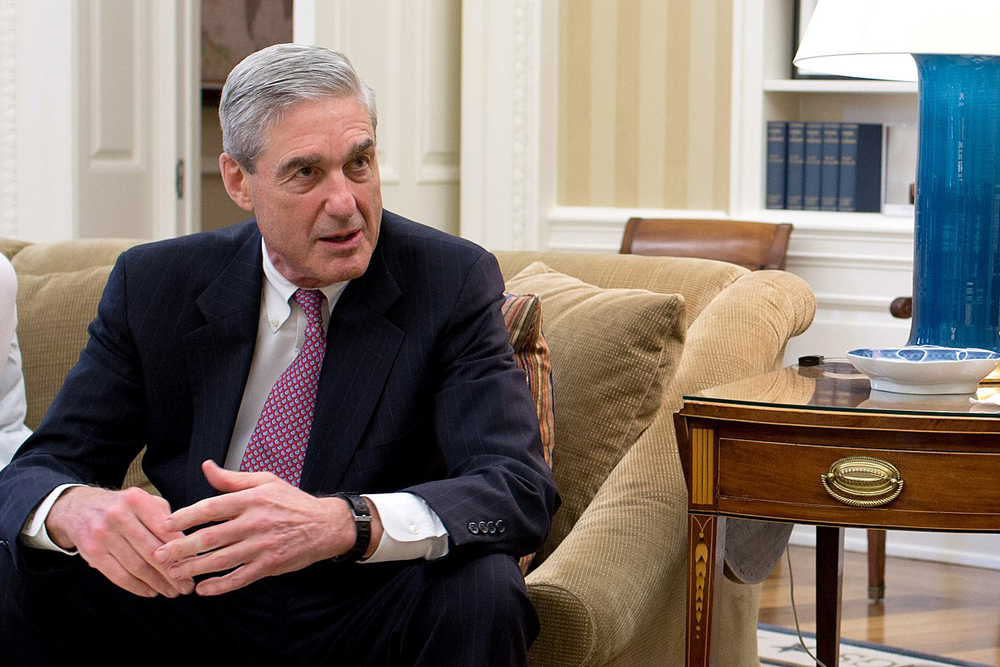
Robert Mueller, pictured in a 2012 photo (Pete Souza/The White House)
What did we learn from the former special counsel Robert Mueller's testimony before two House committees? You will have seen plenty of reports in the papers that speak about most of the issues, but let's step back and consider if we learned anything about the state of our democracy in these hearings.
The most obvious fact was the degree to which the complete moral collapse of the Republican Party was on full display. Their attempts to tear down the reputation of Mueller — a decorated Marine, a man who has served this country with distinction for decades and had been appointed to a position of responsibility by every Republican president since Ronald Reagan — were despicable. Their attempts to lay a glove on him were tragicomic in the extreme, and their moral culpability is not diminished one iota by their inability to do so.
To what end? To protect a president whose moral corruption was evident on at least every third page of the Mueller report? Yes and no. Except in the case of Congressman Louie Gohmert, this was self-interest, politicians worried that if they do not dabble in the bizarre conspiracy theories hatched at Fox, or if they speak honestly about the president's corruption, they will land a series of hostile tweets from the president and a primary challenger. Gohmert's case is different because I think he really does think as the president does. His sincerity is not exculpatory, but it is different.
The Democrats were not repugnant, but they were frequently ridiculous. Their foolishness started before the hearing did, as they hyped the hearing even though Mueller had been clear he did not intend to go beyond what was said in the report. Once the questioning started, they tried every which way to get Mueller to expand upon what was stated in his report, but his discipline was unshakeable. Some gave little speeches, which sounded canned.
The exception to the rule was Congressman Adam Schiff, chair of the House Intelligence Committee. He made the point that whether or not a criminal conspiracy could be charged, there are certain things expected of people who claim to love their country and welcoming and encouraging the interference in our elections by a foreign adversary is not something a patriot does. "Protecting the sanctity of our elections begins, however, with the recognition that accepting foreign help is disloyal to our country, unethical and wrong. We cannot control what the Russians do, not completely, but we can decide what we do, and that this centuries-old experiment we call American democracy is worth cherishing." Schiff was trying to define deviancy up again, after three years of Trump defining it down.
The degree to which the members of Congress showed themselves at their worst was only heightened by the austere, aging, sober Mueller. True, he was not sharp in the morning session at the Judiciary Committee, and he was never someone who would make a riveting witness in the television age. But, it was obvious that he is the antithesis of Trump. Mueller respects law and rules because he knows they exist for good reasons. He knows the value of speaking cautiously. He knew that his career had been marked by an abiding, and decidedly nonpartisan, service to the country.
A friend wrote, "Something so honorable in it. Very Washington serving as general during the French crisis even though past his prime." The analogy is imprecise: Washington allowed himself to be a tool of Alexander Hamilton and one of the most distinctive aspects of Mueller's testimony was the degree to which he avoided being made a tool of anyone. But, the analogy works because it focuses on that kind of patriotism that is worthy of respect, the kind of patriotism we associate with George Marshall and his generation, undemonstrative but real, tested and refined in the furnace of war, profoundly committed to our Constitution and the republic it birthed.
Need one point out how different that patriotism is from the variety on display at a Trump rally, all vulgar and shallow, culminating not in quiet and honorable service but in cheers of adulation for a draft dodger with fascistic tendencies and ambitions. The president asserts that the four congresswomen in "the Squad" hate America, but he is the one who has repeatedly engaged in activities that undermine our democracy, criminal or not, and does so in ways that would make Richard Nixon blush.
Mueller's testimony did nothing to get our country out of its current conundrum. The president plainly engaged in activities that warrant impeachment, but he has so terrified the members of his own party that they are unwilling to accept what their eyes see. They indulge in conspiracy theories and play a game of "I know you are but what am I?" arguing that it was the Democrats who were really colluding with Russia. They would never vote to impeach and convict him, so going down that road will only permit the president to claim a victory. Not impeaching and convicting him sends the message that sometimes a president is above the law. There is no way out of this conundrum.
Justice may yet be served. When asked if the president could be indicted once he leaves office, Mueller said, "Yes." But, while that eventual outcome might serve the cause of justice, in the meantime our democracy is being undermined and one party is responsible for it. It is not the Democrats.
[Michael Sean Winters covers the nexus of religion and politics for NCR.]
Editor's note: Don't miss out on Michael Sean Winters' latest. Sign up and we'll let you know when he publishes new Distinctly Catholic columns.
Advertisement






